This Week in Labor History
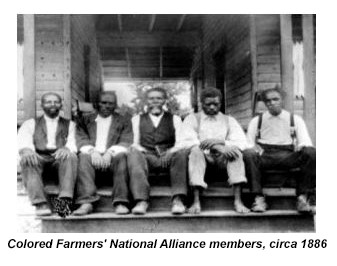 December 11
December 11
A small group of Black farmers organize the Colored Farmers’ National Alliance and Cooperative Union in Houston County, Texas. They had been barred from membership in the all-White Southern Farmers’ Alliance. Through intensive organizing, along with merging with another Black farmers group, the renamed Colored Alliance by 1891 claimed a membership of 1.2 million – 1886
Ten days after an Illinois State mine inspector approved coal dust removal techniques at New Orient mine in West Frankfort, the mine exploded, largely because of coal dust accumulations, killing 119 workers – 1951
The U.S. Department of Labor announces that the nation’s unemployment rate had dropped to 3.3 percent, the lowest mark in 15 years – 1968
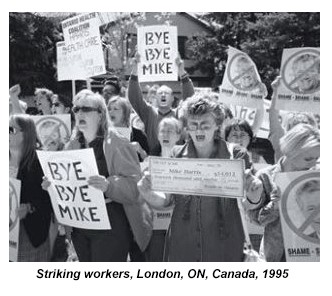 Forty thousand workers go on general strike in London, Ontario—a city with a population of 300,000—protesting cuts in social services – 1995
Forty thousand workers go on general strike in London, Ontario—a city with a population of 300,000—protesting cuts in social services – 1995
Michigan becomes the 24th state to adopt right-to-work legislation. The Republican-dominated state Senate introduced two measures—one covering private workers, the other covering public workers—by surprise five days earlier and immediately voted their passage; the Republican House approved them five days later (the fastest it legally could) and the Republican governor immediately signed both bills – 2012
December 12
A U.S. immigration sweep of six Swift meat plants results in arrests of nearly 1,300 undocumented workers – 2006
December 13
Death in San Antonio, Texas, of Samuel Gompers, president and founder of the American Federation of Labor – 1924
December 14
Some 33,000 striking members of the Machinists end a 69-day walkout at Boeing after winning pay and benefit increases and protections against subcontracting some of their work overseas – 1995
December 15
AFL convention passes a 1¢ per capita assessment to aid the organization of women workers (Exact date uncertain) – 1913
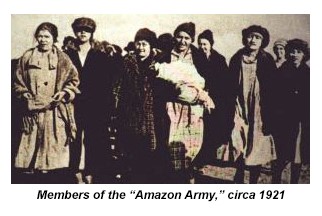 The Kansas National Guard is called out to subdue from 2,000 to 6,000 protesting women who were going from mine to mine attacking non-striking miners in the Pittsburg coal fields. The women made headlines across the state and the nation: they were christened the “Amazon Army” by the New York Times – 1921
The Kansas National Guard is called out to subdue from 2,000 to 6,000 protesting women who were going from mine to mine attacking non-striking miners in the Pittsburg coal fields. The women made headlines across the state and the nation: they were christened the “Amazon Army” by the New York Times – 1921
Eight days after the attack by Japan on Pearl Harbor, the AFL pledges that there will be no strikes in defense-related plants for the duration of World War II – 1941
Meeting in its biennial convention, the AFL-CIO declares “unstinting support” for “measures the Administration might deem necessary to halt Communist aggression and secure a just and lasting peace” in Vietnam – 1967
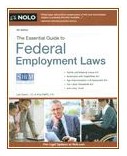 The U.S. Age Discrimination in Employment Act becomes law. It bars employment discrimination against anyone aged 40 or older – 1967
The U.S. Age Discrimination in Employment Act becomes law. It bars employment discrimination against anyone aged 40 or older – 1967
(The Essential Guide To Federal Employment Laws, 4th edition: This is a well-indexed book, updated in 2013, offering the full text of 20 federal laws affecting workers’ lives, along with plain-English explanations of each. An entire chapter is devoted to each law, explaining what is allowed and prohibited and what businesses must comply.)
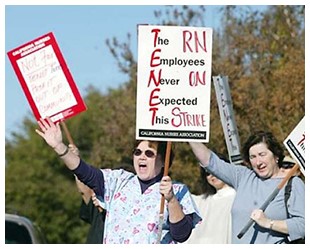 California’s longest nurses’ strike ended after workers at Doctors Medical Center in San Pablo and Pinole approved a new contract with Tenet Healthcare Corp., ending a 13-month walkout – 2003
California’s longest nurses’ strike ended after workers at Doctors Medical Center in San Pablo and Pinole approved a new contract with Tenet Healthcare Corp., ending a 13-month walkout – 2003
Mine, Mill and Smelter Workers union organizer Clinton Jencks, who led New Mexico zinc miners in the strike depicted in the classic 1954 movie Salt of the Earth, dies of natural causes in San Diego at age 87 – 2005
December 16
The National Civic Federation is formed by business and labor leaders, most prominently AFL president Sam Gompers, as a vehicle to resolve conflicts between management and labor. Not all unionists agreed with the alliance. The group turned increasingly conservative and labor withdrew after Gompers’ 1924 death – 1900
 New York City’s Majestic Theater becomes first in the U.S. to employ women ushers – 1902
New York City’s Majestic Theater becomes first in the U.S. to employ women ushers – 1902
The Bagel Bakers of America union is continuing a work slowdown at 32 of New York’s 34 bagel bakeries in a dispute over health and welfare fund payments and workplace sanitation, the New York Times reports. Coincidentally—or not—lox sales were down 30 percent to 50 percent as well. The effect on the cream cheese market was not reported – 1951
Four railway unions merge to become the United Transportation Union: Trainmen, Firemen & Enginemen, Switchmen, and Conductors and Brakemen – 1968
Eight female bank tellers in Willmar, Minn., begin the first strike against a bank in U.S. history. At issue: they were paid little more than half what male tellers were paid. The strike ended in moral victory but economic defeat two years later – 1977
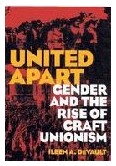 (United Apart: Gender and the Rise of Craft Unionism: At the turn of the twentieth century, American factory workers were often segregated by sex—males did heavier, dirtier, and better paid, work while women might be employed in a separate area performing related, lighter work. Men might cut bolts of fabric, for example, while women stitched cuffs onto sleeves. How this division of labor played out when an occupational group comprised of one sex went on strike is the subject of this book.)
(United Apart: Gender and the Rise of Craft Unionism: At the turn of the twentieth century, American factory workers were often segregated by sex—males did heavier, dirtier, and better paid, work while women might be employed in a separate area performing related, lighter work. Men might cut bolts of fabric, for example, while women stitched cuffs onto sleeves. How this division of labor played out when an occupational group comprised of one sex went on strike is the subject of this book.)
December 17
Int’l Union of Aluminum, Brick & Glass Workers merges with United Steelworkers of America – 1996
—Compiled and edited by David Prosten
